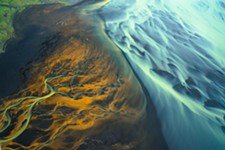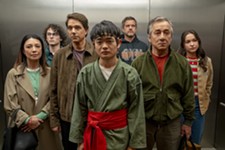
Mountain
2018, PG, 74 min. Directed by Jennifer Peedom. Narrated by Willem Dafoe.
REVIEWED By Richard Whittaker, Fri., June 8, 2018
Sufferers of vertigo, take note. Mountain contains graphic scenes of extreme heights, cliffs, and crests. Yet do not let that sinking feeling in your stomach put you off from experiencing the wild joys of this extraordinary documentary about the great, truly remote places, a visual essay somewhere between the elation of The Blue Planet and the meditations of Koyaanisqatsi.
Jennifer Peedom has made two of the great documentaries about the modern explorer: Solo, charting Andrew McAuley's ill-fated attempt to kayak from Tasmania to New Zealand; and Sherpa, which rewrote the traditional adventure story as a labor rights issue in Nepal's 2014 climbing season. However, both used individual figures to probe humanity's connection to the wilderness, the places we have not and will not ever really domesticate. Here she pulls back, not to show the human on the mountain, but the concept of a mountain. Whether it's extreme bikers on Alpine crags, base jumpers dropping from spiderweb cradles strung between buttes, or mountaineers spinning prayer wheels in the Himalayas, she questions why we have changed from fearing them in antiquity as places of pure danger, to our new relationship of adoration and obsession. In a perfect fusing of Renan Ozturk's cinematography, Australian Chamber Orchestra Artistic Director Richard Tognetti's score, and the soothing, sage-like ruminations of narrator Dafoe (drawn from the writings of leading mountaineering journalist Robert Macfarlane), Peedom deals in sensation and spectacle, rather than details. The only peak mentioned by name is Everest – and then solely for its cultural significance, and the significance of its "conquering" by Hillary and Tenzing, not for its height. Instead, this is a tone poem, constructed primarily from drone and helicopter footage, with layers of GoPro and vintage material stratified throughout. Mountains are explored through the lenses of mysticism, imperialism, and (increasingly) tourism, but Peedom and Macfarlane make it clear that, however humans come to them, the mountains will only ever accept them on their own terms. There's no attempt to anthropomorphize the rock and and glaciers, but they have never seemed more terrifying and alluring.There is judgement among the wonder, with the commercialization, rebranding and re-engineering of mountains coming under subtle, mournful scrutiny. It would be easy to condemn Peedom and Macfarlane as acting as gatekeepers to the peaks, and it is undoubted that mountaineering is, even without an explicit statement, presented as the purest way to approach them. But that is never because that's their preferred hobby. Instead, the film's core argument is that if the quest is for a sense of wonder in the wilderness, the climber's way is the supplicant's path. It's the one in least denial that makes the greatest attempt to remember that mountains care not, even as we obsess about them. These are, as Dafoe so perfectly explains, places of terrible joys and dreadful splendors.
A note to readers: Bold and uncensored, The Austin Chronicle has been Austin’s independent news source for over 40 years, expressing the community’s political and environmental concerns and supporting its active cultural scene. Now more than ever, we need your support to continue supplying Austin with independent, free press. If real news is important to you, please consider making a donation of $5, $10 or whatever you can afford, to help keep our journalism on stands.








